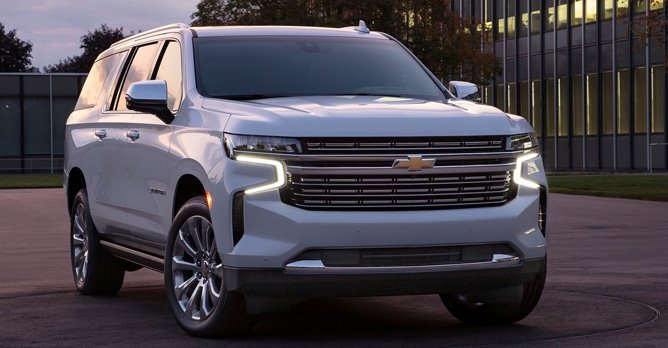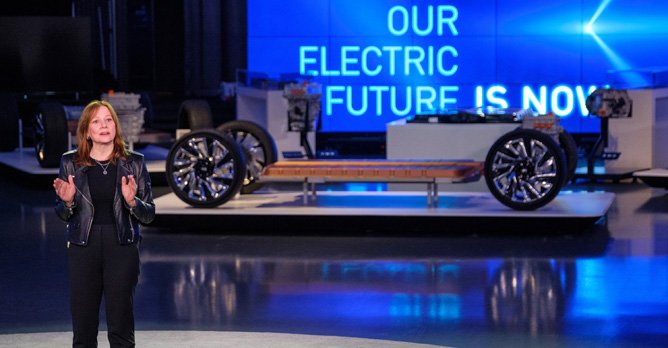General Motors aims to be carbon neutral by 2040
02 Feb 2021|816 views
General Motors (GM) has announced that it plans to become carbon neutral in its global products and operations by 2040 and has committed to setting science-based targets to achieve carbon neutrality. The company has also signed a Business Ambition Pledge, an urgent call to action from a global coalition of UN agencies, business and industry leaders.
In addition to GM's carbon goals, the company worked with the Environmental Defense Fund (EDF) to develop a shared vision of an all-electric future and an aspiration to eliminate tailpipe emissions from new light-duty vehicles by 2035.
GM's focus will be offering zero-emissions vehicles across a range of price points and working with all stakeholders, including EDF, to build out the necessary charging infrastructure and promote consumer acceptance while maintaining high quality jobs, which will all be needed to meet these ambitious goals.
General Motors is committed to reaching carbon neutrality in its global products and operations by 2040, supported by a commitment to science-based targets. To reach its goals, GM plans to decarbonise its portfolio by transitioning to battery electric vehicles or other zero-emissions vehicle technology, sourcing renewable energy and leveraging minimal offsets or credits.
The use of GM's products accounts for 75% of carbon emissions related to this commitment. GM will offer 30 all-electric models globally by mid-decade and 40% of the GM's U.S. models offered will be battery electric vehicles by the end of 2025. GM is investing almost $36 billion in electric and autonomous vehicles in the next five years - up from the $26.6 billion planned before the onset of the COVID-19 pandemic.
This investment includes the continued development of GM's Ultium battery technology, updating facilities such as Factory ZERO in Michigan and Spring Hill Manufacturing in Tennessee to build electric vehicles from globally sourced parts and investing in new sites like Ultium Cells LLC in Ohio as well as manufacturing and STEM jobs.

The company will also continue to increase the fuel efficiency of its traditional internal combustion vehicles in accordance with regional fuel economy and greenhouse gas regulations. Some of these initiatives include the development of fuel economy improvement technologies, such as Stop/Start, aerodynamic efficiency enhancements, downsized boosted engines, more efficient transmissions and other vehicle improvements.
To address emissions from its own operations, GM will source 100% renewable energy to power its U.S. sites by 2030 and global sites by 2035, which represents a five-year acceleration of its previously announced global goal.
General Motors (GM) has announced that it plans to become carbon neutral in its global products and operations by 2040 and has committed to setting science-based targets to achieve carbon neutrality. The company has also signed a Business Ambition Pledge, an urgent call to action from a global coalition of UN agencies, business and industry leaders.
In addition to GM's carbon goals, the company worked with the Environmental Defense Fund (EDF) to develop a shared vision of an all-electric future and an aspiration to eliminate tailpipe emissions from new light-duty vehicles by 2035.
GM's focus will be offering zero-emissions vehicles across a range of price points and working with all stakeholders, including EDF, to build out the necessary charging infrastructure and promote consumer acceptance while maintaining high quality jobs, which will all be needed to meet these ambitious goals.
General Motors is committed to reaching carbon neutrality in its global products and operations by 2040, supported by a commitment to science-based targets. To reach its goals, GM plans to decarbonise its portfolio by transitioning to battery electric vehicles or other zero-emissions vehicle technology, sourcing renewable energy and leveraging minimal offsets or credits.
The use of GM's products accounts for 75% of carbon emissions related to this commitment. GM will offer 30 all-electric models globally by mid-decade and 40% of the GM's U.S. models offered will be battery electric vehicles by the end of 2025. GM is investing almost $36 billion in electric and autonomous vehicles in the next five years - up from the $26.6 billion planned before the onset of the COVID-19 pandemic.
This investment includes the continued development of GM's Ultium battery technology, updating facilities such as Factory ZERO in Michigan and Spring Hill Manufacturing in Tennessee to build electric vehicles from globally sourced parts and investing in new sites like Ultium Cells LLC in Ohio as well as manufacturing and STEM jobs.

The company will also continue to increase the fuel efficiency of its traditional internal combustion vehicles in accordance with regional fuel economy and greenhouse gas regulations. Some of these initiatives include the development of fuel economy improvement technologies, such as Stop/Start, aerodynamic efficiency enhancements, downsized boosted engines, more efficient transmissions and other vehicle improvements.
To address emissions from its own operations, GM will source 100% renewable energy to power its U.S. sites by 2030 and global sites by 2035, which represents a five-year acceleration of its previously announced global goal.
Latest COE Prices
June 2025 | 2nd BIDDING
NEXT TENDER: 09 Jul 2025
CAT A$98,124
CAT B$116,670
CAT C$65,000
CAT E$116,889
View Full Results Thank You For Your Subscription.




















